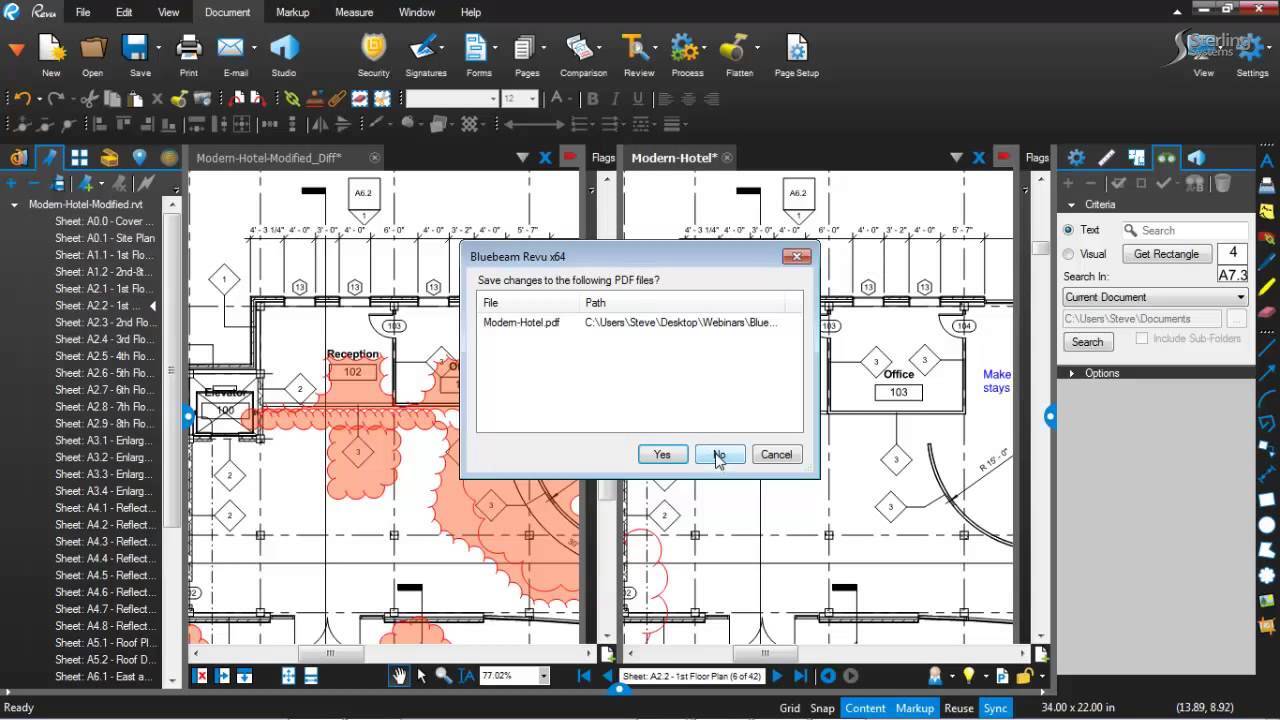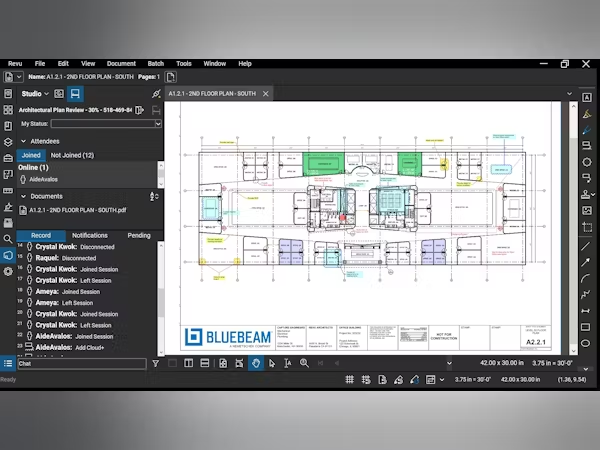
In an industry that requires efficiency and accuracy, Bluebeam Revu has become a go-to software for engineers, architects, and construction professionals for collaborations and markups. Widening its capabilities as a software, its extended plugins, namely, Bluebeam Autocad plugin and Bluebeam Revit plugin, play a large role.
There is a long list of Bluebeam plugins that can help streamline your workflow and boost productivity. Bluebeam in construction projects can be widely used to achieve better documents that can be easily shared among team members.
Want to get work done quickly and efficiently?
Explore and brush up on your Bluebeam skills with top plugins and shortcut keys to master smart and quick work in this fast-moving AEC industry.
Why Shortcuts & Plugins Matter in Bluebeam?
As Bluebeam Revu is widely known as a go-to tool for document management and markups, it is essential that the software's efficiency also caters to time. One of the most functional uses of Bluebeam Revu lie in its shortcuts and plugins.
Its integration with AutoCAD as the Bluebeam AutoCAD plugin or with Revit as the Bluebeam Revit plugin, or even the Bluebeam Sketchup plugin and Bluebeam plugin for Rhino, all are provided with seamless integration. Bluebeam shortcut keys eliminate the need for constant mouse navigation, allowing you to execute commands with lightning speed.
Together, they create a highly optimised environment that significantly boosts productivity, reduces repetitive tasks, and minimises errors.
Most Useful Bluebeam Keyboard Shortcuts for Engineers
Master time management and fast work with these Bluebeam Revu shortcuts and save hours off your workweek. These are a must-know for speeding up daily engineering tasks such as redlining, sketching, and reviewing PDFs.
These are some of the common Bluebeam Revu Shortcuts used:
1. A - Arrow
The Arrow key helps in page navigation and precise markup page adjustment.
2. Q - Callout
The Callout tool acts as an additional text tool. It allows you to add text annotations with leader lines that can be used for markups.
3. Ctrl + F2 - Export Markups
This tool allows you to save and transfer markups to other team members.
4. F - File Attachment
The File Attachment tool allows you to directly embed files within a document.
5. I - Image
As the name suggest, this tool allows you to insert images within the PDF document.
6. H - Highlight
Acting as a highlighter, this tool allows you to highlight any text or content in the PDF that requires attention.
7. Ctrl + F3 - Import
This tool allows you to import or bring in external data into your document.
8. L - Line
The Line tool allows you to quickly draw straight lines and segments wherever required in your document.
9. R - Rectangle
This tool helps in the quick drawing of rectangles in your document.
10. T - Textbox
The Textbox tool allows you to add in notes or labels to the document, but without leader lines.

Top Bluebeam Plugins for AEC Professionals
There is a list of Bluebeam plugins that cater to as modelling tools. These plugins are essential for AEC professionals who need accurate document exchange between design platforms and construction teams. Here’s some of the plugins that are useful:
1. Bluebeam Plugin For Revit
Essential for BIM-based workflows, Bluebeam Plugin for Revit allows you to create high-quality, hyperlinked PDFs directly from Revit, preserving crucial data like smarter markups with the smart layer control. This facilitates round-trip workflows, where markups from Bluebeam can be imported back into Revit for review and implementation.
2. Bluebeam Plugin For AutoCAD
For engineers that are well-versed with AutoCAD, this is great for heavy workflows and enables direct PDF creation from DWG files while preserving layers and object data. Making it easier to manage and navigate complex drawings, engineers look to this plugin.
3. Bluebeam Plugin For SketchUp
You can create 3D PDFs directly from SketchUp Pro with the Bluebeam SketchUp plugin and leverage all of Revu's 3D markup and navigation functionality. It maintains the model's components and enables effective collaboration.
4. Bluebeam Plugin for Rhino
The Bluebeam Revu plugin for Rhino doesn’t have an official plugin. You can export the Rhino model for producing a Bluebeam-compatible 3D PDF file or OBJ Rhino geometry, that can be converted to a PDF. The softwares print dialog helps to send sheets to the Bluebeam PDF printer.
5. Bluebeam Plugin For Navisworks
Navisworks is known to be an essential tool for clash detection and BIM coordination. The plugin allows you to export 3D PDFs directly from the Navisworks models, enabling rich 3D markup and collaboration.
6. Bluebeam Plugin For SolidWorks
Similar to the Revit and AutoCAD plugins, this integration allows SolidWorks users to create detailed PDFs of their designs with embedded 3D models. This allows for enhanced collaboration and reduces misinterpretations through a paperless workflow.
7. Bluebeam Plugins for Microsoft Office
The Microsoft Office Plugins that can be used are Word, PowerPoint, Outlook, and Excel. These plugins enable quick and accurate PDF creation from your standard office documents, ensuring consistent formatting and easy sharing.
How to Install and Manage Plugins in Bluebeam
For enabling plugins, after installing Bluebeam Revu, go to the Bluebeam Administrator. Before you go through the long list of Bluebeam plugin or download any, confirm your Revu version and compatibility with that particular plugin. Here are the steps required during the installation of a Bluebeam plugin:
- To install a particular plugin, you should first close the application.
- Then go to the Bluebeam Administrator, open the plugins tab and select your plugin.
- Select Apply or OK to activate the plugin.
- Relaunch the particular application, same as the plugin.
- You will see a Bluebeam tab/ribbon/toolbar after which you can continue using this plugin.
Generally, Bluebeam plugins are installed during the initial Bluebeam Revu installation, so if you have missed the steps during initial installation, rerun the installer and modify the setup to include the desired plugin.
Pro Tip: If a plugin isn't appearing, try unchecking the box in Bluebeam Administrator, clicking Apply, opening and closing the CAD application, then returning to Bluebeam Administrator, re-checking the box, and clicking OK before restarting the CAD application again.
In some cases, a full reinstallation of Bluebeam Revu, ensuring the desired plugins are selected during the installation process, may be necessary.
How can I manage a plugin in Bluebeam?
To enable or disable the plugins, use the Bluebeam Administrator. The Administrator can turn on access to third-party plugins also.
Conclusion
Whether you’re an engineer or an architect, Bluebeam Revu and its plugins act as a collaborative platform more than just a PDF viewer or markups platform. The most commonly used plugins are the Bluebeam AutoCAD Plugin and Bluebeam Revit Plugin from the list of Bluebeam plugin.
Mastering Bluebeam Revu from the BIM Professional Course for Civil Engineers by Novatr will help you leverage the shortcuts and top plugins to enhance the workflow processes.
Visit our Resource Page to gain knowledge on the latest industry-used software and tools!
FAQ’s
1. How do I install the Bluebeam Revit plugin?
To install the Bluebeam Revit Plugin, ensure you have the latest version of Revit and Bluebeam installed, that are compatible with each other. Then install the plugin for Revit from the Bluebeam website or installations and access it in the ribbon.
2. How do I install the Bluebeam Autocad plugin?
To install the Bluebeam AutoCAD Plugin, ensure you have the latest version of AutoCAD and Bluebeam installed, that are compatible with each other. Then install the plugin for Revit from the Bluebeam website or installations and access it in the ribbon.
3. What are the most used Bluebeam Revu shortcuts?
The most commonly used Bluebeam Revu shortcuts are:
L - Line
T - Textbox
Q - Callout
A - Arrow
Ctrl + F2 - Export Markups
R - Rectangle
H - Highlight
4. What is the Bluebeam checkmark shortcut?
The Bluebeam Checkmark Shortcut is not an official shortcut. You can create your own Checkmark tool or find a pre-loaded punch symbol for it.
5. What is Bluebeam Add Control Point Shortcut?
The Bluebeam Add Control Point Shortcut helps you create a new control point while working on shape or line markups. By holding down Shift and click on the line segment, you can create new line segments and adjust the shape of the markup.
Was this content helpful to you










